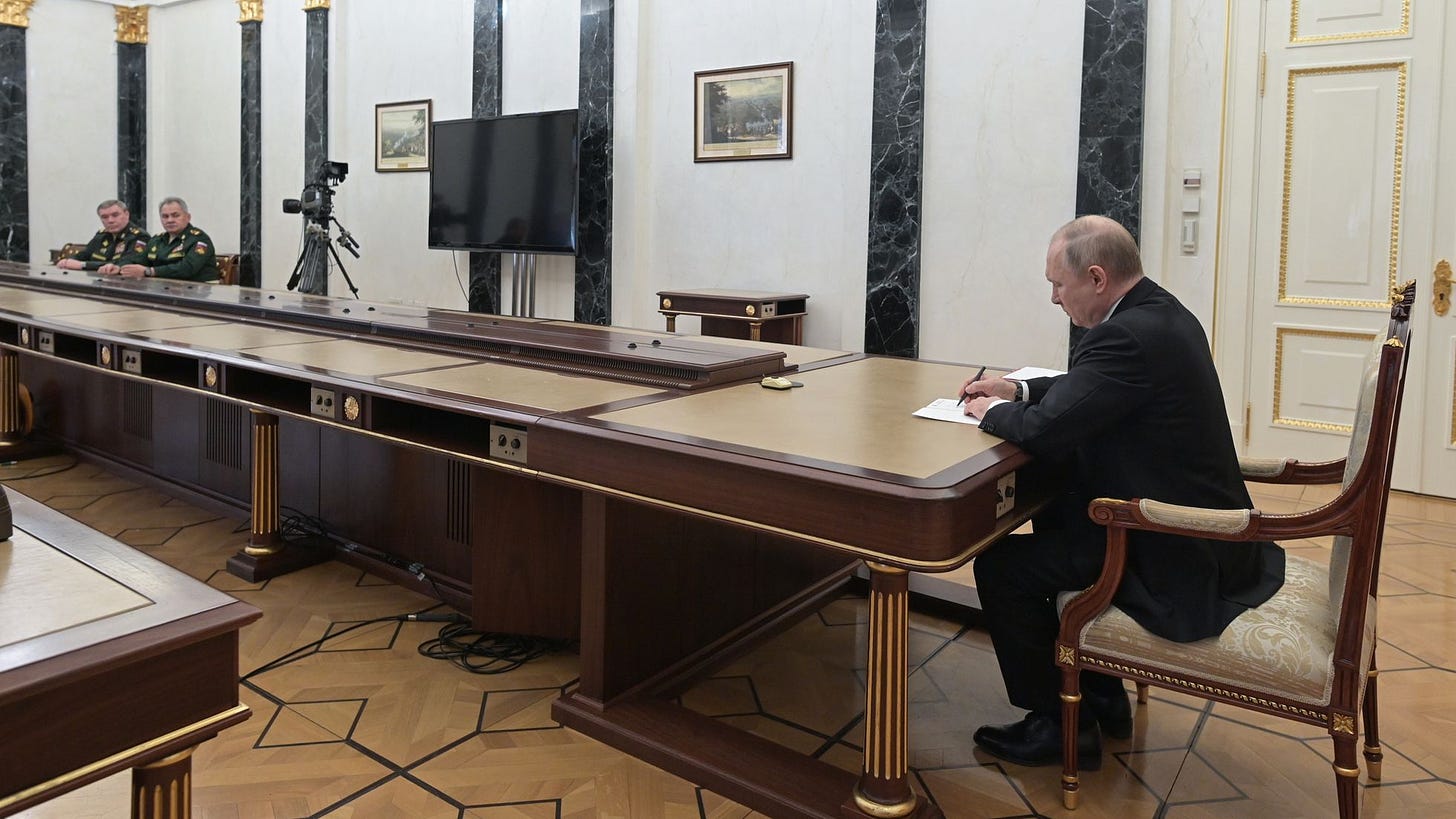With the war in Ukraine not going as expected—it is now in its fifth day without Kyiv or any other major city in the country yet falling to the invading Russian forces—Putin’s frustrations are becoming apparent. Some of those played out over the weekend as he put Russia’s “deterrence” force into a “special regime of combat duty,”which is another way of saying Russian nuclear weapons would be in an increased state of readiness to launch.
Notably, he made this announcement on Russian television, telling his generals at an oddly staged meeting (Putin sits at a long table more than 30 feet away from any others purportedly because of his fear of contracting Covid) that he was doing so because “leaders of major NATO countries are making aggressive comments about our country.” Social media lit up with the image of a stony-faced General Valery Gerasimov, who looked none too pleased with the order and simply nodded.
If it seems odd that unspecified “aggressive comments” from Western leaders would trigger Putin to put his nuclear arsenal on higher alert, many others were scratching their heads, too. A leading political science academic, Graham T. Allison of Harvard University, whose book on the Cuban missile crisis has been required reading for policy wonks for decades, told the New York Times that Putin’s behavior was “bizarre,” that “it makes no sense,” and rather alarmingly that it was “adding to the worry that Putin’s grasp on reality may be loosening.”
The Biden Administration chose to deescalate rather than raise U.S. nuclear alert levels. Linda Thomas Greenfield, the U.S. ambassador to the United Nations, reiterated to the Security Council that Russia was under no threat and said that Putin “is continuing to escalate this war in a manner that is totally unacceptable.” Press Secretary Jen Psaki quipped, “This is exactly the kind of manufactured threat that President Putin has been using since the beginning of this crisis to justify further aggressive action.”
The move by Putin indeed may be a calculated one, timed to coincide with Belarus announcing that a “referendum” in the country to change the constitution to renounce the nation’s non-nuclear status had succeeded, permitting the return of nuclear armaments to that country’s soil. Speaking at a “polling station” on Sunday, Belarus President Lukashenko declared that he could now ask Russia to once again place such weapons in the country. “If you [the West] transfer nuclear weapons to Poland or Lithuania, to our borders, then I will turn to Putin to return the nuclear weapons that I gave away without any conditions,” Lukashenko said. The former Soviet Republic had joined Ukraine in surrendering its nuclear weapons to Russia after the fall of the Soviet Union in exchange for security guarantees related to their borders—guarantees that Russia violated with respect to Ukraine when it invaded Crimea in 2014 and again last week.
It seems to many that Putin desperately wants to reestablish a Cold War-era stalemate mentality where the threat of nuclear weapons and mutual assured destruction kept satellite states within Russia’s sphere of influence without the risk of increasing encroachment by NATO and the West. Russia’s recent and extraordinary warnings of “political-military consequences” to neighboring Finland and Sweden should they join NATO—a threat the two nations brushed off quickly—reinforce this view. Russia is now acting like a nation backed into a corner and lashing out; it just happens to have nuclear weapons with which to lash out.
President Biden has been careful to be clear that U.S. troops will not be sent to Ukraine precisely in order to prevent a direct confrontation with Russia, one that might escalate quickly and increase the chance of a nuclear response, either due to an intentional strike or a miscalculation. In 1983, the world very nearly went to nuclear war over mistaken readings by Soviet computers that the U.S. had launched a preemptive strike—a situation that apparently was only diffused because one operator, Stanislav Petrov, hesitated to register that a U.S. launch had actually occurred. Had he followed protocol, the entire world would have been a smoldering ruin. The White House understandably wants to steer far clear of any chance of miscalculation or misreading.
Without a U.S. escalation to a higher DEFCON level, it’s unlikely that Putin’s saber rattling will raise the stakes higher than the invasion of Ukraine itself has. With the war there going rather badly so far, and with it likely to extend into a long and costly insurgency unless peace talks succeed soon, Putin had hoped to throw the West off-balance with nuclear and other threats. So far, he has not succeeded. Rather, his bellicosity has only increased the desire of other nations to join NATO so that they don’t become another Ukraine.





It’s good to see the people pushing back against this bully
Thanks for referencing the incident surrounding Stanislav Petrov. To expand upon it, that same autumn during NATO manuevers in operation Able-Archer the Soviet generals became convinced (because NATO was stupidly ordered to use real communication codes) that the West was about to attack and sent all 60 Warsaw Pact tank divisions heading towards the German border. We came even closer to WWIII than in the Cuban Missile crisis.
It illustrates the potential for miscalculation during periods of heightened alertness. One suspects that Putin may feel that he has no other card to play, but it is one fraught with hazards.